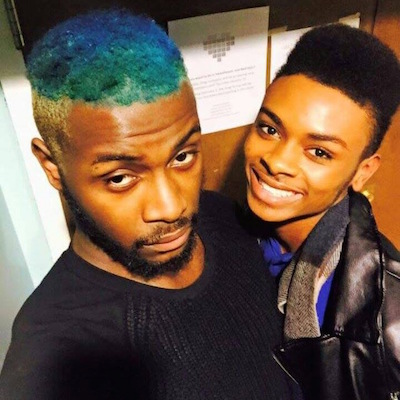Youth Voices: Dorianne Joseph Talks Misconceptions, Inspirations and His Role as a Mentor to Gay Children
G Philly presents a new collaboration with youth from The Attic Youth Center to spotlight the creative magic and cultural contributions of Philly’s LGBTQ youth of color. Today, 20-year-old Dorianne Joseph
What is the most common misconception about LGBTQ youth?
Most people treat people from any of those spectrums as if they’re not human. For me, coming up there were a lot of things I did in school that, because of my sexuality, people thought I shouldn’t be doing. For instance, all through high school I was a part of the Reserve Officers’ Training Corps (ROTC). A lot of the boys felt like, “but you’re gay. Why would you want to be doing something so manly?” At the end of the day I’m still just a boy, just like you are. I can do half the things that you all want to do. I know plenty of people who come from that aspect, and that walk of life, who do normal things. I feel like we, as young LGBTQ people, have normal lives, but a lot of people think that—whether we’re lesbian, gay, bi, pansexual, trans*, or questioning—that we’re abnormal.
Who inspires you?
My first inspiration was my grandmother. She passed not too long ago, but I still look up to her. For the most part, I kind of looked up to my mom and my grandmom, because they were the two people who raised me for the majority of my life. They are the two people who—no matter what was going on, what was wrong in the world, or just wrong in our lives, in general—helped me get back on track and taught me to keep moving forward no matter what. Even if the roof is falling in: keep pushing on, keep moving forward, keep going, do your best at everything you can.
What do you imagine for you future?
I’ve been thinking about this question a lot. I want my future to be happy—no matter where it is, where it’s at, what I’m doing in life. A lot of people think that, because you are or aren’t at a certain place in life, then that automatically makes you a failure. In my opinion, if you’re happy with where you’re at, then that’s success.

Dorianne with friend Eric.
What is your favorite thing about being in this community?
The role that has combined all my identities and skills is as a mentor to my gay children. (In the black LGBTQ community, we often refer to our chosen family, or our closest LGBTQ friends, as children, brothers, or sisters.) These kids look up to me the most, and I try to teach them the same things I was taught. I hope they can move forward and go farther than I have. I try to push them to do more, even when they feel like they can’t do it. I’m that person that’s like, “you can do it, put your mind to it, I’ll help you do this, I’ll help you do that.” You just have to keep pushing forward. If you honestly want to graduate high school, sure, math might be a tough subject, but you can come over to my house and study every day. Having gay children means a lot to me. In a lot of cases I’ve used them as a way to push myself forward. I have had to use them to remind myself that all of these people are looking up to me. So, if I fall I have to get back up, because if I don’t get back up, they won’t get up.
If you could directly address the LGBTQ population-at-large, what would you want to say to them?
The biggest thing I’ve always felt like I wanted the LGBTQ community to learn is unity. I feel like we allow a lot of things to separate ourselves from one another. Like, not too long ago, I was having a conversation with a close friend, because they recently came out about their HIV status. People ridiculed them, which made me so mad. Everybody is quick to complain that don’t have any HIV-positive role models, but then when we’re presented with one, and everyone wants to ridicule them. Things would become a lot better if everybody stood up for each other and looked out for each other and not just looked out for some.


